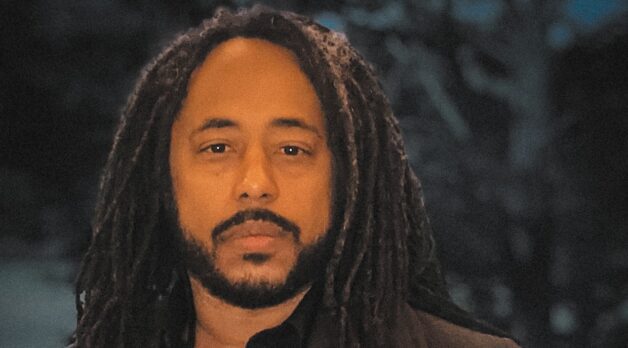Jason Fitzroy Jeffers
 Jason Fitzroy Jeffers
Jason Fitzroy Jeffers

Growing up in Barbados in the 1980s, “It was very easy to feel like you were on the outside of everything. Getting access to art from elsewhere was really challenging,” says Jason Fitzroy Jeffers, remembering the bootleg video store in a shipping container full of last year’s Hollywood releases he’d visit, or the marked-up copies of The Source he’d buy to read about Public Enemy, Nas and A Tribe Called Quest. Local history, such as the fact that the Caribbean “was almost a staging ground for the Cold War,” was, for a teenager, even more elusive. “You would hear whispers of things,” he continues. “I was always a very curious kid with a wild imagination but didn’t have the resources or training to push me in the direction of acting upon those curiosities and interests.”
Always wanting to be a filmmaker, Jeffers says the career just seemed out of reach, and that when he arrived in Miami at 18, “journalism became my way of telling stories.” After graduating from Florida International University, he worked as a beat reporter for publications like the Miami Herald and SunPost, covering everything from gentrification to crime to the opening of a coffee shop. He calls the time at SunPost, when he was the sole reporter, “a boot camp” that trained him for “turning stories around quickly and being able to latch onto what makes people’s brains and minds and interests light up”—qualities, of course, that are vital for filmmaking, too.
That transition began when Jeffers produced Jonathan David Kane’s 2014 short, Papa Machete, giving up his apartment and selling furniture to do so. Touring that film to festivals and seeing the paucity of work from the Caribbean led him and his co-founders to create the Third Horizon Film Festival, where Jeffers then worked as the festival director. In 2022, though, Jeffers took on two new feature film projects, and “It quickly hit me that, man, I can’t run a festival and write and produce a narrative feature and direct a documentary.” He made the “difficult decision” to step down from Third Horizon (he’s still the board chair) to devote his time to the two new works. Continuing a collaboration with Keisha Rae Witherspoon—he produced her BlackStar-premiering 2019 short, T—Jeffers is both co-writing and producing (the latter alongside Kane and Mollye Asher) the director’s Arc, which summons “a sub-tropical pre-millennial tension” in its depiction of a Black UFO cult.
Then, there is the film that takes him back, full circle, to his youth in Barbados, The First Plantation (working title). The island country, which only cut its colonial ties to Britain in 2021, is both the world’s newest republic and its oldest plantation-based economy. It was a “petri dish,” says Jeffers—“in many ways, the laboratory for the British to perfect plantation slavery before exporting so many of the modalities and legislation surrounding it here to the States. The Barbados slave code was virtually copied in South Carolina, then spread to all these other parts of the 13 colonies.” The documentary’s specific focus is Drax Hall Estate, a plantation owned for nearly 400 years by the same family and now the subject of calls for it to be part of reparations to the Barbadian people. “Funnily enough, other than the work of John Akomfrah, one of my biggest creative influences on the film has been Twin Peaks,” says Jeffers. “The idea of going to a place that is very idyllic, but underneath there’s something ugly and old and brutal festering. You look at the advertising, and Barbados is one of the most exciting tourism destinations in the world, but what do those ads conceal? I’m really exploring the cognitive and spiritual dissonance of that.”
Produced by Darcy McKinnon and coproduced by Romola Lucas, The First Plantation, which mixes archival material with Jeffers’ travels back to the country to speak to residents and government officials on the front lines of the Drax Hall debate, has received funding so far from Doc Society, ITVS, JustFilms/Ford Foundation, Field of Vision, the Threshold Fund, Sundance Documentary Fund and the Southern Documentary Fund, and is slated for a ’26 finish.
“We’re in the homestretch now,” says Jeffers, “and I’m zeroing in on bringing to life the feelings that I felt growing up in the island and exploring its plantation ruins. All these things that I felt as a child—this heaviness, this spiritual weight I couldn’t articulate—I can only make sense of now as an adult as all this history starts to emerge. The truth is, we weren’t taught any of this in Barbados when we were growing up.”—Scott Macaulay
